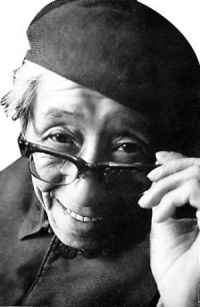Qian Jiajun
Qian Jiajun (Chinese: 钱家骏) was the creator of a number of China’s earliest and award-winning cartoons, including "A deer with nine colors," "Why are the crows black?" and "Baby tadpoles look for their mother." Though not as famous as most of his students dubbed as the "golden generation" of China’s animation industry, Qian was regarded as one of the important industry founders.
Born in 1916, Jiangsu Province, Qian developed a great interest in literature and art. In 1935, he graduated from Suzhou Fine Arts College and became a professional cartoon artist. He used to work as the director of Chongqing Educational Film Animation Studio, the board director of an animation school in Hong Kong and the director of China Film Production Factory in the Republic of China (1911-1949). After 1949, he was hired byShanghai Animation Film Studio as its art designer, director and leading technician. Meanwhile, he also took jobs as professors in various art and film schools.
In 1940, his maiden animation "Happiness in Peasant Family," a black and white movie with soundtracks, won wide accolade in the fallen country during the anti-Japanese Aggression War (1937-1945). The film was hailed as a parallel with the contemporary patriotic cartoon "The River all in Red," produced by the famous animation pioneers, Wan brothers.
With profound skills in Chinese water painting, Qian was regarded as the first generation of the artists working for the Shanghai Animation Film Studio after the founding of the People’s Republic of China in 1949. Though he wasn’t the industry’s iconic figure during that time, his contribution to the animation industry was impressive. "Many techniques were created from his ideas that he had proven to work with numerous experiments," one of his old colleagues said.
Qian died of lung infection on August 15, 2011 at the age of 95. Before his passing, Qian said that death eventually comes to everyone, so there was no need to fight or argue, and it was enough to leave others a good impression.
Qian required no funeral before his death, but his children and colleagues still held a small memorial for him.

